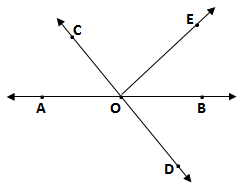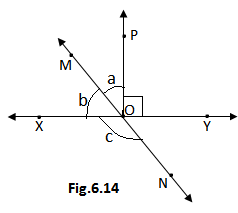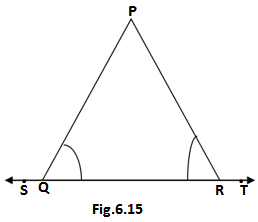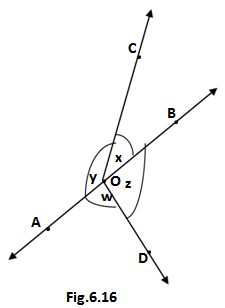NCERT Solutions for Class 9 Maths Chapter 6 Exercise 6.1 - Lines and Angles

Introduction to NCERT Solutions for Class 9 Maths Chapter 6 Exercise 6.1
Understanding Lines and Angles is essential for mastering geometry, which forms the basis for advanced mathematical concepts. Class 9 Maths Chapter 6 – Lines and Angles explores these fundamental concepts, preparing students for future studies and CBSE board examinations.
Exercise 6.1 in this chapter provides targeted practice to help students build their problem-solving skills. Our detailed NCERT Solutions for Class 9 Maths Chapter 6 Exercise 6.1 are designed by subject experts and presented in a step-by-step method. This approach ensures that students can easily grasp each concept and solve problems independently, boosting their confidence and exam readiness.
Why Are We Studying Lines and Angles in Class 9?
Studying lines and angles in Class 9 is crucial for several reasons:
- Foundation for Geometry: Class 9 Maths Chapter 6 – Lines and Angles introduces fundamental geometric principles that are the basis for understanding more complex topics in future mathematics courses.
- Enhances Problem-Solving Skills: Mastering Exercise 6.1 Class 9 helps students develop analytical and logical reasoning abilities, essential for tackling advanced mathematical problems.
- Supports CBSE Exam Preparation: Understanding Chapter 6 Class 9 Maths aligns with the CBSE curriculum and helps students perform better in board examinations by building a strong foundation.
- Prepares for Higher Education: A solid grasp of lines and angles prepares students for higher-level geometry and other related subjects in higher education.
Download Class 9 Maths Chapter 6 Exercise 6.1 Solutions PDF
To make studying more convenient, you can download the NCERT Solutions for Class 9 Maths Chapter 6 Exercise 6.1 in PDF format. This will allow you to review the solutions offline and keep them handy for quick reference.
NCERT Solutions for Class 9 Maths Chapter 6 Exercise 6.1
Q1. In Fig. 6.13, lines AB and CD intersect at O. If ∠AOC + ∠BOE = 70° and ∠BOD = 40°, find ∠BOE and reflex ∠COE.

Answer:
We are given
∠AOC + ∠BOE = 70°
∠BOD = 40°
∠BOD = ∠AOC (Vertically opposite angle)
∴ ∠AOC = 40°
Putting values of ∠AOC in the given equation ∠AOC + ∠BOE = 70°
40 + ∠BOE = 70
∠BOE = 30°
∠AOE + ∠BOE = 180° (Linear pair)
∠AOC + ∠COE + ∠BOE = 180°
40° + ∠COE + 30° = 180°
∠COE = 180° – 70° = 110°
Reflex ∠COE = 360° – ∠COE
Reflex ∠COE = 360° – 110° =250°
Therefore ∠BOE =30° and reflex ∠COE =250°
Q2. In Fig. 6.14, lines XY and MN intersect at O. If ∠POY =90° and a:b=2:3, find c.

Answer:
We are given
∠POY =90° and a: b =2: 3
∠POX = 180° – 90° = 90°(Linear pair)
Let a = 2x and b = 3x
∠POX = a + b = 90
2x + 3x = 90
5x = 90°
x = 18°
Therefore a = 2×18 = 36° and b = 3× 18 = 54°
Since MON is a line therefore b and c are linear pair
∴b + c =180°
54° + c = 180°
c = 180° – 54° = 126°
Hence the value of c is 126°
Q3. In fig. 6.15 ∠PQR = ∠PRQ, then prove that ∠PQS = ∠PRT

Answer:
Given: ∠PQR = ∠PRQ
To Prove: ∠PQS = ∠PRT
Proof: In the given fig.
∠PQS + ∠PQR = 180° (Linear pair)…..(i)
∠PRT + ∠PRQ = 180° (Linear pair)…..(ii)
From equations (i) and (ii)
∠PQS + ∠PQR = ∠PRT + ∠PRQ
∠PQR = ∠PRQ (given)
∠PQS + ∠PRQ = ∠PRT + ∠PRQ
∠PQS = ∠PRT
Hence Proved
Q4. In fig.6.16 if x +y = w +z, then prove that AOB is a line.

Answer: We have In the given figure
Given: x +y = w +z
To Prove: AOB is a line
Proof: From the figure, we can observe that all the given angles form a complete angle of 360°
Therefore we can write
x +y + w +z = 360° (complete angle)
w + z + w + z = 360°
2w + 2z = 360°
2(w + z) = 360°
w + z = 180
The sum of w and z implies that both angle w and z forms a linear pair, so AOB is a line.
Q5. In Fig. 6.17, POQ is a line. Ray OR is perpendicular to line PQ, OS is another ray lying between rays OP and OR. Prove that ∠ROS = 1/2(∠QOS -∠POS).

Answer:
Given: POQ is a line
OR ⊥ PQ
∴ ∠POR = 90° and ∠QOR = 90°
To Prove: ∠ROS = 1/2(∠QOS -∠POS)
Proof: POQ is a line (given)
Therefore ∠POR and ∠QOR are the linear pair
∠POR + ∠QOR = 180°
∠POS + ∠ROS + 90° = 180°
∠POS + ∠ROS = 90°…..(i)
From the fig. we have
∠QOS = ∠QOR + ∠ROS
∠QOS = 90° + ∠ROS
∠QOS – ∠ROS = 90°……(ii)
From (i) and (ii)
∠POS + ∠ROS = ∠QOS – ∠ROS
∠ROS + ∠ROS = ∠QOS – ∠POS
2∠ROS = ∠QOS – ∠POS
∠ROS = 1/2(∠QOS – ∠POS)
Hence proved
Q6. It is given that ∠XYZ = 64° and XY is produced to point P. Draw a figure from the given information. If ray YQ bisects ∠ZYP, find XYQ and reflex QYP.
Answer:

We are given
∠XYZ = 64°
Let ∠PYZ = 2x
∠QYZ = ∠QYP = x ( YQ is the bisector of ∠PYZ)
Since PYX is a line,so
∠PYZ +∠XYZ = 180°
∠QYZ + ∠QYP + 64° = 180°
x + x = 180° – 64° = 116°
2x = 116°
x = 58°,so ∠QYZ = ∠QYP = 58°
∴∠XYQ = ∠XYZ + ∠QYZ = 64° + 58° = 122°
Since ∠QYP = 58°, therefore reflex ∠QYP = 360°-58° = 302°
Hence ∠XYQ = 122° and reflex ∠QYP = 302°
Access Other Exercise Solutions of Class 9 Maths Chapter 6 Exercise 6.1
Chapter 6 of the NCERT Class 9 Maths textbook on Lines and Angles includes two additional exercises. To access the NCERT Solutions for these exercises, please click the link below.
Exercise 6.2 Solutions for Lines and Angles Class 9 include 6 questions: 3 short answer questions and 3 long answer questions.
Exercise 6.3 Solutions for Lines and Angles Class 9 include 6 questions: 5 short answer questions and 1 long answer question.
Frequently Asked Questions (FAQ's) - Class 9 Maths Chapter 6 Exercise 6.1
Class 9 Maths Chapter 6 Exercise 6.1 focuses on the basics of Lines and Angles. This exercise includes problems about measuring angles, lines that cross each other, and important geometric properties to help understand the chapter.
The solutions for Class 9 Maths Chapter 6 Exercise 6.1 offer clear, step-by-step explanations of each problem. This helps students understand the concepts better and get ready for their exams more effectively.
You can download the NCERT Solutions for Class 9 Maths Chapter 6 Exercise 6.1 in PDF format from our website, the link is in the post. This allows you to access the solutions offline and study whenever you like.
The solutions for Exercise 6.1 are designed to match the CBSE curriculum for Class 9 Maths, making sure they cover all the important topics and help students meet the learning goals of the chapter.
Yes, using the detailed solutions for Class 9 Maths Chapter 6 Exercise 6.1 can greatly improve your problem-solving skills and help you prepare better for your exams, leading to better performance in Class 9 Maths.
Conclusion
In conclusion, Class 9 Maths Chapter 6 Exercise 6.1 on Lines and Angles is crucial for grasping essential geometric concepts. Our thorough NCERT Solutions for Exercise 6.1 provide detailed explanations and step-by-step instructions to help you succeed in this chapter. By mastering these solutions, you can improve your problem-solving skills and build confidence for your upcoming exams.
To practice more and access the solutions offline, download the PDF from our website. Also, check out additional resources and related posts to support your studies and achieve success in Class 9 Maths.
